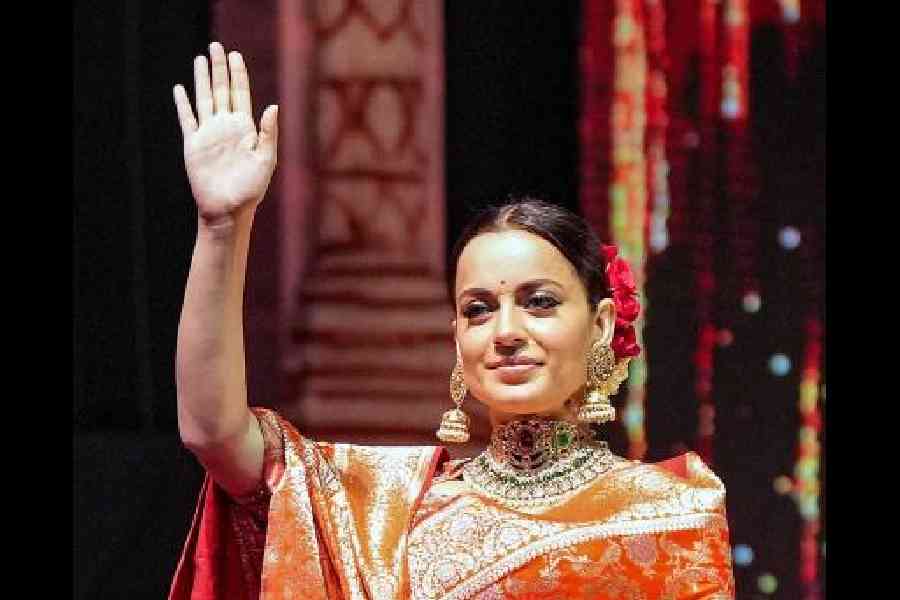On Wednesday June 25, 1975, as a young early riser, I was the first to reach the offices of The Free Press Journal in Bombay and look at the teleprinter. The arrest of Jayaprakash Narayan, Morarji Desai, L.K. Advani and others seemed unreal as I called up the editor to read out what the news agency had just reported. But the full import of Indira Gandhi’s Emergency hit us only a couple of hours later. We were also around when she was assassinated in 1984.
But when an actress who wasn’t even born during Indira Gandhi’s rule made a film titled Emergency, I wondered what had drawn her to that era.
On the day that she awaited the censor certificate, Kangana Ranaut was in high spirits.
“Born in the late 80s, we missed the Mrs Gandhi phase and I’d wonder about the Emergency,” she explained. “I’m politically and socially aware and want to be a part of any conversation about national interest. But I was triggered only after I read that Jiddu Krishnamurthi asked her to end the Emergency and she said, ‘I feel I’m riding a beast. If I get off now, it will eat me up’.”
Kangana also looked at it as a love story.
“There’s a very intense romance in the dynamics between the janata and a leader. Today, some have a problem when Narendra Modiji is called names like Ram avatar but that’s been the case with every popular leader. Like the slogan ‘Abhinav Chandi Durga… Indira, Indira, Indira’. We make them larger than life but the same leader would also have a shower of slippers thrown at her, two complete extremes. In all this, I found a deeply vulnerable person. Look at Sheikh Hasina. Goli se bachke nikalna pada. Indira Gandhi was Abhinav Chandi Durga but was also shot down by a bullet. What’s it like to be PM of this country and what does it do to you psychologically? ”
It sounded different from Gulzar’s Aandhi (loosely based on Mrs G’s life) and Madhur Bhandarkar’s Indu Sarkar that documented the Emergency.
“It is very different,” Kangana stressed, amplifying why she drew a parallel with Christopher Nolan’s Oppenheimer. “You can’t decide whether to root for the protagonist or whether she’s manipulative, whether she’s weak or strong, she’s taking you for a ride or she’ll rise to the occasion. My film had been shot and was in post-production when I saw Oppenheimer and thought, ‘Wow, it’s so much like Emergency.’”
Apart from seeing her film as a celluloid piece of “our history”, Kangana believed that it was not about judging anybody as good or bad, “But to see how the biggest can fall prey to hubris.
“It hasn’t been easy making this film, getting the world’s best crew together... The world’s best prosthetics artiste (Oscar-winning Kazuhiro Tsuji) who did Gary Oldman’s makeup in The Darkest Hour. The best DoP (Oscar nominated Tetsuo Nagata). It’s not easy getting their contracts drawn up, talk with their agencies, get the schedules in place.”
Besides, Kangana’s last few films didn’t fare well and that made a difference too. “It wouldn’t have been so difficult for me had my last film worked,” she accepted. “People lose confidence in you especially when the film industry wants to do typical stuff and you are making something very different. The protagonist herself (Indira) is elderly, in her 60s.”
But it was not her portrayal of Indira that gave her a kick. As an actor, she no longer aims for another National Award. “But I’ve become very ambitious as a filmmaker. I think I’m a very natural director.”
Now that she is an MP, will Emergency be Kangana’s last film?
“I hope not,” she chuckled. “If I get bigger responsibilities (in politics), my engagement will increase there. But till I’m only an MP, I would love to direct films.”
The one question that remains: will Sikh protests and other political voices allow Emergency a peaceful release all over India?











